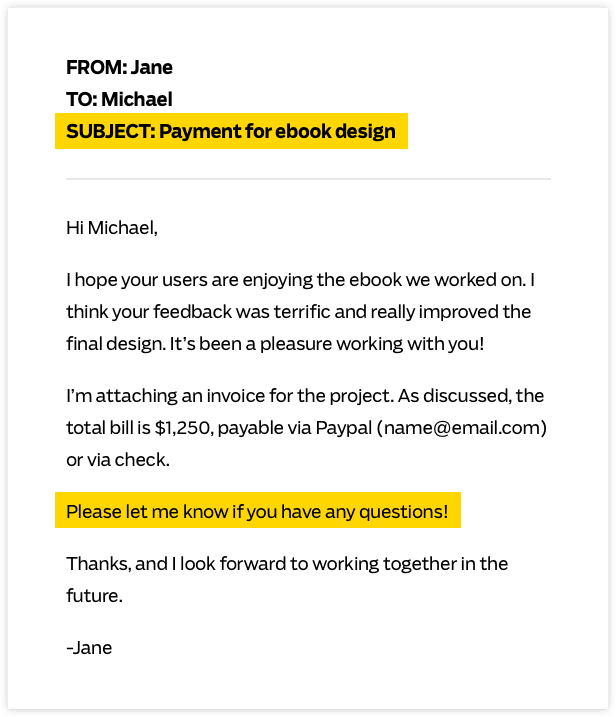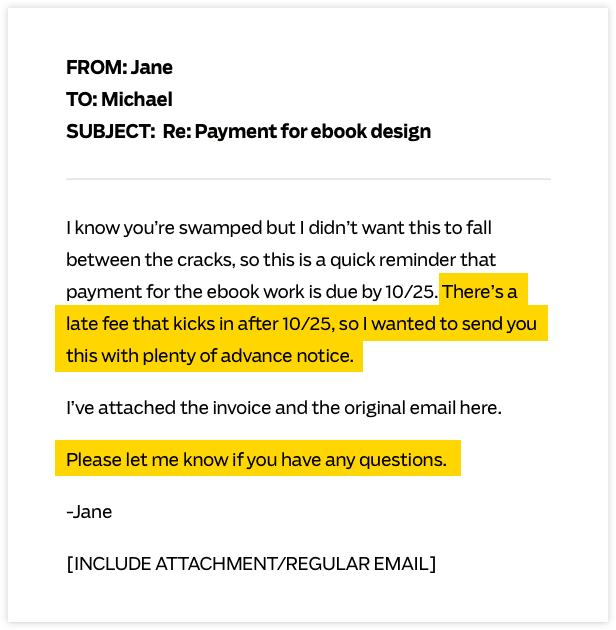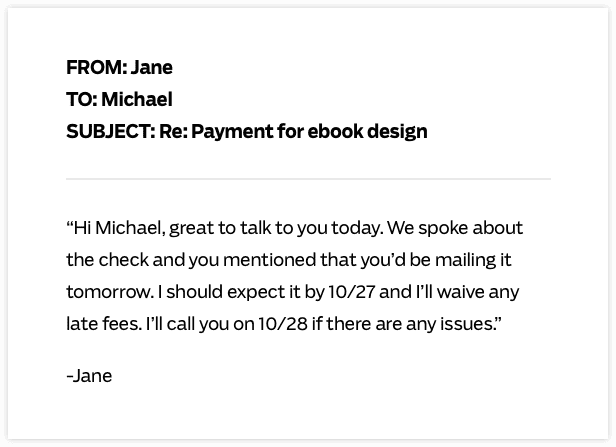How to request payment and ACTUALLY get paid: 4 Easy Steps


Some clients are TERRIBLE about paying on time. That’s why you need to learn the art of the payment request, especially if you’re a freelancer…
...but when it comes to how to ask for payment, what’s the best way to do it?
You do it politely — and with scripts.
Specifically, this one:
Example of a polite email asking for payment:

Of course, you’re going to have to mold this script to fit your situation, but I promise you it works.
I know because it’s based on the same one I used when I freelanced. I created a simple, 2-part system that has worked for me time and time again. Now, I’m giving it to you.
I offer even more word-for-word scripts in my business program Earnable. You get all the exact strategies, frameworks, hands-on tactics, real-world examples, mindsets, done-for-you templates, word-for-word scripts, and hard-won breakthroughs to start and grow your own business. Click here to learn more.
The 4-step system can be split up into two parts:
Part 1: How to ask for payment politely
- How to (nicely) send a payment request email
- Backup: How to send a follow-up email that works
Part 2: How to break a client’s legs firmly ask for payment
- How to stop them from hiding behind their computer
- The Nuclear options (for when all else fails)
Part 1: How to ask for payment politely
The following system only works after one stipulation is fulfilled:
If you haven’t fulfilled your obligation to your client and given them great work that you both agreed you’d provide, then you only have yourself to blame if they’re not going to pay you.
To help you with this, be sure to check out my 16-minute video with Steve Dublanica on how providing world-class service to your customers can attract even better customers.
https://youtu.be/0RVBs4O7SaI
Step 1: Send your client a payment request
When you complete the deliverables for your client, it’s time to pull out that email script we gave you upfront.

What do you notice about the email?
First, it’s friendly. When crafting an email asking for payment, it’s easy to default to the this-is-super-serious-business-so-I-need-to-be-super-serious tone — but you have to remember that you’re trying to develop a good relationship with your client, and that’s built on friendliness.
Another great reason this email just works is that the subject line does not contain any mention of prices at all. There’s no easier way to let your email go unread than to include the price in the subject line and your message will have a 100% better chance of being read if it didn’t.
A few more observations:
- Ask for the payment simply and be straightforward. Tell them you have included the invoice as part of the email and how you want to be paid.
- The conclusion is polite and lets them know that you’d love to work more with them in the future.
- This script also uses the exclamation point very strategically. Its placement at the end is intentional and leaves everything on a playful tone.
Overall, it’s simple, direct, and actionable. You can use this email for both old and new clients. Use this script and most of your clients should pay you within two weeks.
Free mini course: Take control of your success with our new How to Design Your Rich Life mini-course. It's a fast, fun, and free introduction to our Rich Life approach.
Step 2: Send a follow-up email
If your client hasn’t responded in two weeks, send them a follow-up email. This message will be more firm and apply a little bit of pressure while making it seem like you’re doing them a favor.
Here’s the script:

Notice the framing. You recognize that they’re probably busy and that you didn’t want the message to “fall between the cracks,” so you’re simply reminding them of the invoice before they’re charged with a late fee. You don’t want to accuse your client of anything, or else you risk alienating them. So always give them that bit of deniability.
Make it easy for your client to get back to you by attaching the invoice as well as the original email.
However, this email is clearly not as playful as the last one. Notice there’s no exclamation point at the end. When compared to the initial email, this message projects that you’re much more serious. You want your client to know you are serious about being paid.
The world wants you to be vanilla...
…but you don’t have to take the same path as everyone else. How would it look if you designed a Rich Life on your own terms? Take our quiz and find out:
Part 2: How to firmly ask for payment (without breaking any legs)
In life, though, there are four things that are guaranteed:
- Death
- Taxes
- Frugalistas being wrong
- Clients not paying you on time
And you might be at a point where you’re ready to really shake down your client in order to get your payment. That’s okay. Trouble clients happen from time to time. It’s inevitable.
What matters most now is that you take action in order to get them to pay you. That means you’ll have to start dialing the phone.
Step 3: Call them (so they can’t hide behind their computer)
If your client hasn’t responded to your messages after 3 – 4 weeks since the first email, you’ll want to call them.
Calling people takes away the protective layer of anonymity that emails provide — making it MUCH harder to ignore your payment request.
And if you’re worried about not knowing what to say, fear not. Because I have a script that will kick the conversation off:
“Hi, [CLIENT’S NAME]. It’s [YOUR NAME]. I worked on the XYZ project with you about a month ago. I’ve sent a couple of emails about payment for the project, and I think you might’ve missed them. Have you received them?”
A few things of note:
- The script reminds them of the project and your agreed-upon payment.
- You’re still friendly and even assume that they haven’t seen your emails (this shows that you trust your client).
- If something did go wrong (email went to the spam folder, you used the wrong email address, etc), you and your client can address the issue to prevent it from happening again.
When you’re finished, make sure you close the loop using this script:

As with the emails, you want to remain friendly and never lose your cool. It’s surprisingly easy to start blowing up at a person and demand, “YOU PAY ME NOW, OR ELSE!!!” but the moment you do that, you stand to both tarnish your reputation and lower your chances of ever getting paid.
Remember: Be like Fonzie.
https://youtu.be/Qz-R857qXrM
Step 4: The nuclear options (for when all else fails)
If for some reason your client continues not paying after three emails and a phone conversation, you have three options:
- Cut ties with the client
- Be annoyingly persistent
- Hire a collection agency
1.) Cut ties with the client
I actually suggest you do this option above all others.
You’ll want to cut ties with the client as soon as possible. The reasoning is simple: As a freelancer, you are your own best asset. You need to value your time and energy as such by not wasting either on awful clients.
2.) Be annoyingly persistent
If the payment is worth the trouble, you should email your client the invoice and call them…
…Every. Single. Day. Until they pay, that is (or you put them on Clients From Hell and call it even).
You need to make sure you keep your cool during these emails and phone calls because it’ll be easier now more than ever to blow up at them.
When you connect with them on the phone, you can use this simple script to get the conversation started:
“Hi, [CLIENT’S NAME]. It’s [YOUR NAME]. I worked on the XYZ project with you back in [TIME FRAME]. I’ve sent a couple of emails about payment for the project and also tried connecting with you on the phone. When can I expect my payment?”
After a while, your client should realize that you’re not going to give up and pay you. If they don’t, though, you can always try the next option.
3.) Hire a collection agency
This tactic is typically reserved for situations where you put a lot of work into whatever it was you provided for your client (and so the bill is LARGE).
Collection agencies exist to help businesses (e.g. you) attain any debt that is owed to you. In order to do that, though, they typically require that you have all the debt that is owed to you in writing, so make sure you have records of all the email exchanges (as well as the invoices) with your client.
Unfortunately, many collection agencies have a bad rap due to a few that continually harass debtors. That’s why you’re going to want to find a reputable agency that will help you get your money back without resorting to unscrupulous means.
Here are a few ways you can find one that’ll work for you:
- Refer to the Better Business Bureau. The BBB provides ratings for all of the collection agencies near you. Definitely check them out if you’re looking to hire one.
- Search the IDCA and ACA directory. The International Debt Collectors Association and the Association of Credit and Collection Professionals are organizations made up of debt collection agencies that exist to promote ethical standards and practices in the industry.
- Ask other business people. Referrals are another great way to find out whether or not an agency is good.
No matter how they’re found, the agency you hire will take payment through a percentage of the recovered debt (typically 10% – 30%). Yes, it’s a bummer that you won’t get paid the full amount for the work you put in — but something is better than nothing.
If you’ve let the back payments stack up so much that they are worth bringing in an agency, you should learn a valuable lesson: Respect your own time enough that you never continue work with someone who is behind.
Want to work from home, control your schedule, and make more money? Check out my Ultimate Guide to Working from Home.
How do I avoid this in the future?
Remember: Prevention is always better than a cure. So to avoid getting a late-paying client again, you’ll want to make sure you:
- Did the work. It might sound obvious, but nothing’s more embarrassing than asking your client for payment on deliverables you…well, never delivered. That’s why you want to make sure that all the expectations you and your client agreed upon have been fulfilled on your end.
- Invoice promptly. As soon as you’ve finished doing the work for your client, make sure you immediately send an invoice. That way, it’ll be fresh in your client’s mind while they’re happy because they received your service.
- Include a due date. Make sure your invoice includes a clear due date that the client needs to pay you before — lest they incur the wrath of your late fee. Also make sure you didn’t write down the wrong due date or even charged your client for the wrong things.
- Don’t deliver your service until you are paid. Another option is to have very strict criteria for when you deliver your product or service. If lazy clients know they don’t need to pay to receive the deliverable, why would they?
These things might seem small but can go a long way in ensuring a solid relationship with you and your client.